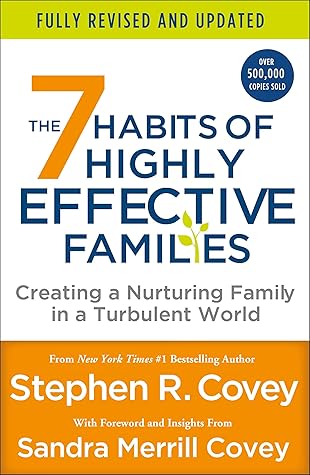More on this book
Kindle Notes & Highlights
Read between
June 13 - July 16, 2025
successful families don’t just happen. They take every bit of energy, talent, vision, determination, and rescue efforts a person can muster. They take prioritizing, planning, and sacrificing. They require family members to be willing to say, “I’m sorry,” and to do whatever is needed to make adjustments.
Habit 5: Seek First to Understand, Then to Be Understood.
Highly effective families are made up of highly effective individuals. So to improve a family culture requires the individuals within the family to improve.
Leadership—including parenting—is an inside-out process. That means you first work to improve yourself before you attempt to influence others. By improving yourself, you automatically improve your family culture.
The teacher always learns the most. This is called teach-to-learn.
The key to creating a nurturing family culture is in how you treat the one who tests you the most.
The key to creating a nurturing family culture is in how you treat the one who tests you the most. There is no real test of leadership with a child or partner who is always cooperative, pleasant, and helpful. Rather, the real test of leadership and love comes when you’re dealing with someone who feels unlovable, who is rebellious and ungrateful after all you have done. That’s the time for true leadership—true love.
dwelling on my past misjudgments gets me next to nowhere, whereas focusing on the possibilities of the future inches me forward—little by little—toward a more pleasing state of being.
Be Proactive. The habit begins with the understanding that we as humans have the freedom to choose.
“Between what happens to us in life (a stimulus) and our reaction (our response) is a space. In that space lies our power and freedom to choose our responses. In our responses lie our growth and happiness.”
self-awareness, conscience, imagination, and independent will.
Conscience is our ethical or moral sense, and is often referred to as our “inner voice.”
Imagination is our ability as humans to envision a future entirely different from our past experiences.
Independent will is what enables us to respond to our genetics and environment.
Of course, not all people take full advantage of their four human gifts. Instead, they idly allow life to act upon them. They merely respond to whatever circumstances come their way. They blame their mistakes and current happiness solely on their genetics and environment, taking no responsibility for their choices.
the best way to predict their future is to create it.
“God grant me the serenity to accept the things I cannot change, the courage to change the things I can, and the wisdom to know the difference.”2
“Your greatest responsibility as a son is to love each of your parents and to chart your own course. You cannot choose what they do, but you can choose your response to what has happened.”
They find it easier to blame their anger on their genetics or their upbringing than to take ownership for it.
They choose not to be controlled by their past, and instead to become the proactive creators of their present and future.
“I may have had a bad past, but I can choose a different path for myself and my future. I can raise and influence my family in such a way that the paradigms of my past will no longer be part of my present family life.”
People who can laugh at their mistakes and clumsiness get back on track in their journeys through life much faster than those who choose to go on guilt trips.
We fix things; we inspire people. We manage things; we lead people.
“Where there is no vision, the people perish.”
A family mission statement is a unified expression from all family members of what your family is about and the principles you choose to live by.
What kind of family do we want to be? What kind of home do we want to invite our friends into? What makes us feel comfortable or uncomfortable in our home? What do we as a family most want to be remembered by?
Value honesty with ourselves and others. Honor the cultures and creeds of all. Respect and accept each person’s unique talents. Promote a kind and happy atmosphere. Resolve conflicts with each other rather than harbor anger. Always be loyal to each other.
The main thing is to keep the main things the main things.


